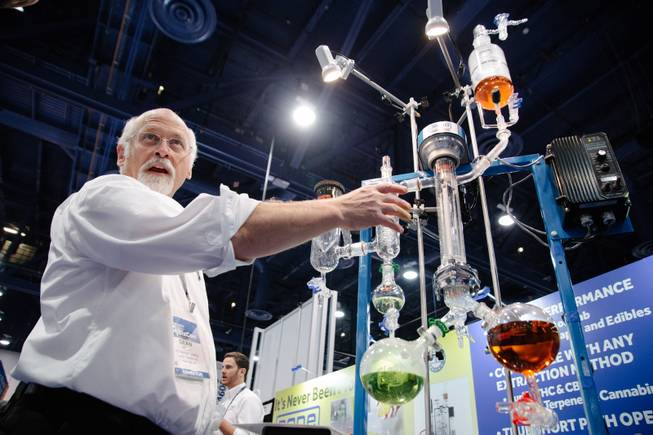Source: lasvegassun.com

Dean Segal of Pope Scientific discusses the function of a molecular still evaporator during the MJ Biz conference at the Las Vegas Convention Center on Wednesday, Nov. 15, 2017.
Legalization of marijuana in eight states — including Nevada — in last year’s election has opened the floodgates for pot businesses to make money.
That’s according to more than a dozen business owners whose products are both directly marketed at buyers in the pot sector, and in similar industries such as farming and plant cultivation.
“Let’s put it like this: A rising tide takes all ships,” said Stuart Titus, CEO of San Diego-based General Hemp. “It’s incredible to see the growth in the industry.”
Titus’ company was one of a record 678 exhibitors at the sixth year of the Marijuana Business Conference & Expo in Las Vegas this month, marketing to an estimated 14,000 show participants. After five years at the Rio, the conference moved to the Las Vegas Convention Center for the first time to accommodate more than 5,000 new attendees from Nov. 15-17.
Among thriving businesses in the expanding pot industry — which grossed $6.7 billion in legal sales in 2016 between the U.S. and Canada, and is expected to reach $20.2 billion in sales by 2021, according to cannabis research firm Arcview Market Research — are producers of hemp products, like Titus.
Hemp, which consists of the seeds and stalks of cannabis plants, contains little or no tetrahydrocannabinol (THC), the psychoactive ingredient in marijuana. It’s legal for production and sale in 37 U.S. states and Puerto Rico. The cannabidiol, or CBD-rich plant, whose oil can be used in lotions or consumed in edible food products, is used for a variety of ailments including dry skin, pain and sleep deprivation.
But as marijuana now has some form of legalized medicinal or recreational use in 28 U.S. states, hemp has seen its customer outreach expand, Titus said. Three hundred hemp companies are now publicly traded, up from just more than 200 a year ago.
“Hemp doesn’t have those negative, harmful side effects,” Titus said, referencing the psychoactive effect of THC in marijuana.
Bruce Perlowin of North Carolina-based Hemp Inc. is another such stem entrepreneur who has seen his business skyrocket as a result of marijuana’s expanding legalization. The flower’s value has dropped from as high as nearly $2,200 per pound as recently as 2014 to about $1,500 this year, according to Connecticut-based New Leaf Data Services. CBD-rich hemp, like that sold by Perlowin’s company, has risen from $21 per pound to $35 per pound in that same time period, he said. Hemp with higher CBD counts can sell for as high as $200 per pound.
Industry analysts attribute the marijuana price decrease to legal weed cultivations providing a higher supply of pot, and the hemp increase to strengthened consumer demand in hemp-based edibles, as well as other products such as stationery, plastics, insulation and construction fibers.
“Marijuana is the fastest-growing industry in the U.S. and CBD hemp is the fastest-growing sector of the fastest-growing industry,” Perlowin said. “Legal marijuana grows more than 5 acres don’t exist, but a 50-acre hemp grow is considered to be very small.”
Almost all of the show’s exhibitors hailed from outside Nevada, some from states where marijuana use and cultivation are still not legal. By setting up shop in Las Vegas, they hoped to do business with clients from weed-legal states where they could ship their products.
Among such exhibitors included Texas-based grower Gary Mermelstein, whose growing kit Scrogger promised to promote maximum growth of marijuana plants by forcing buds to spread evenly at the top, instead of the traditional Christmas-tree style with a pointed top.
“If you’re growing like a Christmas tree, only the top part of the plant is going to get the best light,” Mermelstein said. “When you flatten that thing out, all of the bud sites are within that sweet spot lighting zone.”
“You want the plants bushy rather than tall,” he added. “That goes for marijuana and other plants.”
The marijuana convention wouldn’t be complete without a host of distillation and oil separation systems.
Standing in a lab coat next to a large glass machine, Dean Segal said the Pope Scientific molecular still evaporator, which separates oils from the marijuana plants, stands out among foreign-produced machines because it’s designed and manufactured in Saukville, Wisc. When properly maintained, the machine can produce especially potent concentrates, like wax and shatter, at THC counts of up to 90 percent, Segal said. While the average marijuana flower contains 5-30 percent THC, most concentrates range in the 40-80 percent range.
“It’s a matter of making the quality of the concentrate the best it can be,” Segal said. “And that’s what we do.”
Editor’s note: Brian Greenspun, the CEO, publisher and editor of the Las Vegas Sun, has an ownership interest in Essence Cannabis Dispensary.
No comments:
Post a Comment